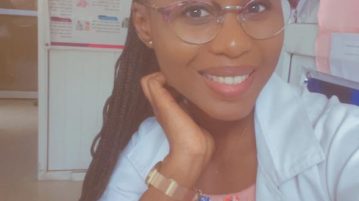While getting other perspectives from healthcare providers (HCPs) across the country, Dr. Rebecca Enejo from the North central (NC) region of Nigeria also shared her thoughts and experiences during and around the general election with our MM correspondent.
Read other HCPs view from the southwest and northeast regions.
MM: What are your thoughts on the abrupt new naira design and circulation policy pre-elections? How did this policy affect healthcare service provision at your end and to what extent did this policy affect the healthcare sector as a whole?
Well, I would say it didn’t affect the health sector to a large extent, at least not at my centre. Because prior to announcement of the naira redesign policy, the use of POS machines was already popular in my facility. However, there was delay in processing those POS transactions or transactions via bank transfer, as the hospital personnel manning those stations must ensure that the money transferred has been received by the hospital before receipt can be issued, and financial claim possible. This in itself certainly caused a clog in the wheel of health care delivery because there were no cash alternatives, as patient and their relatives had no cash to offer in exchange for health care service. In all, the hospital community, patients and their relatives coped because they had no alternatives. Although, time taken to verify transfers and authenticate POS transactions delayed care, but did not stop it altogether.
MM: Thinking on the build up towards the presidential election, would you say that HCPs especially Doctors were rightly involved in the campaign or electoral process?
To start with, Doctors generally are busy people, so I would be surprised to see a lot of doctors involved in campaigns rather than focusing on health care delivery. That said, I think the nature of our practice puts us (doctors) at a stringent end where we have very little option, one of which is electoral and campaign process. Most doctors unfortunately would be busy with clinical work and would not have enough time for campaigns. I honestly feel this is an aberration as the programme should be structured in a such a way to give people time to reflect on their nations electioneering process.
MM: Between the presidential election itself and the announcement result, how was this period for HCPs. Was the whole tension of the election rigours felt within the walls of the hospitals?
Prior to the presidential elections, there was a lot of political discussions ongoing in the hospital; on the corridors, in the theatre, between workers and relatives of patient alike. All hands were on deck as everyone was largely interested in the politics of the nation. People became more politically aware hence, the discussions in the first place. Aside this, nothing else changed in the hospital. People moved on quickly with their lives as soon as the results were announced, because the hospital community is a busy place and no time for shenanigans.
MM: Looking back on the gubernatorial elections especially in your region, what effects do you think the outcome would have on the health sector?
I really do not see any significant difference on the health sector as not much grounds have been covered by the elections. Considering that my state (Kogi) is one of the few states where the governorship elections is yet to hold.
MM: What would then be your expectations or recommendation for the new government concerning the state or national health systems?
Expectations would certainly be high for any new government of the day, irrespective of position. Because everyone is desirous of growth, and they say, “change is the only thing that is constant”. Positive changes are needed in the health care sector as well, not limited to public health awareness and increase in health allocations.
I think care should also be taken to look into government allocated funds to the less privileged to help them fight some common diseases or government and non-governmental organisation (NGO) partnerships to provide funds for some disease that would require a lot of funds like cancer care, End stage Renal Disease (ESRD), diabetes etc. I hope they’ll look into sending funds in this direction as patients and their relatives spend a life fortune for no fault of theirs.
MM: A penny for your thought on the presidential and gubernatorial elections across Nigeria. Also, your advice to HCPs and the general public in this period of elections and transitions?
Basically, my advice to the health care providers would be to ensure they are more involved in the process of choosing leaders of this great nation. Especially, by way of restructuring their timetable to encourage more participation in elections and electioneering process. To the general public all hands must be on deck to support our leaders irrespective of our affiliations and be assured of this one thing: that those we elect, we give power to transform the nation.
The elections have come and gone, everyone should throw their weight behind whom they have elected and see to the success of all Nigerians and Nigeria in general… May we choose the best always.
About Respondent:
Dr. Rebecca E. Enejo is an early career surgeon-in-training, who is dedicated to patient care beyond the hospital. She volunteers with several NGOs such as Adonai Partners, Truthsprout among others to reach the “unreached” through medicine. Beyond medicine, she is certified in Health Leadership and Management from the University of Washington and keenly interested in social entrepreneur for social change.
Currently the Young Doctors Forum Coordinator of Medical Women’s Association of Nigeria (MWAN), Kogi state chapter, she is also a member of several editorial boards including the Junior Doctors Network of World Medical Association (JDN-WMA), Association of Resident Doctors, Federal Teaching Hospital, Lokoja (ARD FTHL) and Medical Women’s International Association (MWIA). She is happily married, and the union is blessed with two children.


